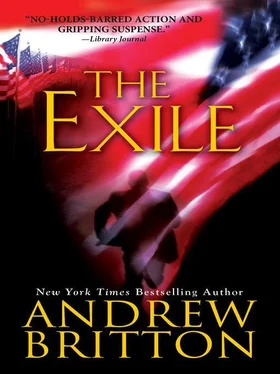Andrew Britton - The Exile
Здесь есть возможность читать онлайн «Andrew Britton - The Exile» весь текст электронной книги совершенно бесплатно (целиком полную версию без сокращений). В некоторых случаях можно слушать аудио, скачать через торрент в формате fb2 и присутствует краткое содержание. Жанр: Триллер, на английском языке. Описание произведения, (предисловие) а так же отзывы посетителей доступны на портале библиотеки ЛибКат.
- Название:The Exile
- Автор:
- Жанр:
- Год:неизвестен
- ISBN:нет данных
- Рейтинг книги:5 / 5. Голосов: 1
-
Избранное:Добавить в избранное
- Отзывы:
-
Ваша оценка:
- 100
- 1
- 2
- 3
- 4
- 5
The Exile: краткое содержание, описание и аннотация
Предлагаем к чтению аннотацию, описание, краткое содержание или предисловие (зависит от того, что написал сам автор книги «The Exile»). Если вы не нашли необходимую информацию о книге — напишите в комментариях, мы постараемся отыскать её.
The Exile — читать онлайн бесплатно полную книгу (весь текст) целиком
Ниже представлен текст книги, разбитый по страницам. Система сохранения места последней прочитанной страницы, позволяет с удобством читать онлайн бесплатно книгу «The Exile», без необходимости каждый раз заново искать на чём Вы остановились. Поставьте закладку, и сможете в любой момент перейти на страницу, на которой закончили чтение.
Интервал:
Закладка:
Reynolds sighed as they both sipped at the hot liquid, his gaze never shifting from the man seated across from him.
The consultant, he had to admit, was not what he had been expecting. Reynolds wasn’t sure why, exactly, but a few things stood out, including his age. For a man with such remarkable connections, he was young…no more than thirty-six or seven, and that was a conservative estimate. His dark hair, which could have been black or a very dark shade of brown, was lightly oiled and cut short to reveal a receding hairline, which, strangely enough, didn’t seem to detract from his youthful appearance. His face was on the narrow side, but open and friendly, particularly around the eyes and mouth, and he wore steel-rimmed spectacles that pinched the bridge of his long nose, contributing to the overall air of subdued intelligence.
And that was what had thrown him, Reynolds realized. The consultant didn’t seem to fit the mold. He wasn’t loud, domineering, and demanding, like most people would be in his position, but quiet and unassuming. He did not have the fleshy, arrogant face of the stereotypical kingmaker, but that of an earnest scholar. He could have been a congressman on the rise, or a surgical resident in one of the country’s better hospitals. In his youth he might have been the captain of the chess club or debate team at an Ivy League school, of which he was no doubt a graduate.
Reynolds idly wondered which one he had gone to. Had it been Harvard, the first choice for America’s moneyed youth? Princeton, maybe? Yale? Perhaps he was wrong, Reynolds thought. Perhaps this youngster had come up the hard way. Perhaps he had gone to Brown.
Setting down his cup, the senior diplomat returned his attention to the document on his desk. It was a letter of introduction, delivered by diplomatic pouch several minutes earlier. The timing was extraordinary, and by no means a coincidence-it had arrived less than a minute before his guest had appeared in the anteroom. Reynolds lifted the top half of the single page and slowly scanned the twelve lines of concise text, even though he had already read the letter several times. A moment later he reached the signatures at the bottom. It was here that his eyes lingered. There were four signatures in all, and they represented some of the most powerful people in the U.S. government, among them the woman who’d called him the previous day.
Reynolds couldn’t help but shake his head in admiration. It was a remarkable document in a number of ways, primarily for the powers it bestowed upon the young man sitting across from him. At first glance, they appeared to be nearly unlimited, though Reynolds reminded himself that the wording in the letter was hardly specific and could be interpreted any number of ways. In his thirty years with the Foreign Service, he had seen some incredibly vague terminology appear in official government documents, and this one was no exception. But still, to see all those signatures, and on one piece of paper…
He looked up and offered a smile, then flicked the fine linen paper with the tip of his finger. “Your credentials are very impressive, Mr. Landis. Beyond reproach, actually.”
The young man couldn’t help but smile at the name. There was no harm in doing so. To the senior diplomat, it would look like he was merely returning the gesture. It had not been easy at first, and he had nearly slipped up a number of times, but he was now accustomed to hearing it.
James Landis. He had held that identity for exactly thirty days, and it was getting easier with each passing week. The chief of mission believed that he had arrived in-country that very day, mainly because that was what he was meant to believe. In reality, Landis had landed in the Republic of Sudan a month before, entering the country through Khartoum International Airport as Harold Traylor…yet another disposable name he’d jettisoned, along with his forged passport, after its purpose had been served.
Just getting into Sudan had been almost as dangerous as the things he’d been doing since. While he would have preferred to enter via a remote border crossing, preferably in the western territories edging up against Chad, most had been closed due to the escalating clashes over the oil fields and pumping stations in West Darfur. The few checkpoints that remained open were so volatile that for any Westerner to attempt a crossing-even a man of his unique and considerable talents-would have amounted to suicide. As a result, he’d been forced to take a direct flight into Khartoum, where alert officials and CCTV cameras were in far greater abundance. There had been some degree of risk in doing so, but he’d made it through customs unscathed, and forty minutes later he’d destroyed any evidence that Harold Traylor ever existed. That passport, along with a New York driver’s license, a well-worn membership card to a video store in Albany, and several credit cards in the same name, had been burned in a back garden at the home of his sole contact in the capital.
Another stop along the road, another shed skin left behind.
Since those first precarious days, his network had expanded with astonishing speed, thanks largely to his contact’s connections in Khartoum and the surrounding areas. The planning itself had involved weeks spent clustered around a table in the Harry S. Truman Building in Washington, D.C., home to the U.S. Department of State. In a soundproofed room on the ground floor, he and a rotating staff of ten had studied everything from the strength of the republic’s dissident groups to the command structure of the Sudanese army. The lengthy strategy sessions had been hard to endure, even though he’d known just how important that information would eventually be to his own welfare. Now Landis was well into the operational part of his plan, but up until this point, he had only been setting the stage. Moving the pieces into place. The next stage was crucial. Fittingly, it would also be far more dangerous. The risks had been mulled over at length-not only by him, but by the men and women who had tasked him with his current assignment, the most challenging and important of his career. After much debate, they had been deemed acceptable.
One of those risks was the man seated across from him now. The problem, Landis knew, stemmed from an incident twenty-five years in the past. Walter Reynolds, then a junior economics officer stationed at the U.S. embassy in Asuncion, Paraguay, had misplaced a stack of sealed bids submitted by various American contractors. The contractors, five in all, were competing for the right to build a four-lane vehicular bridge over the Parana River, a project valued in excess of ten million dollars. One week after the bids went missing, a Japanese company swept in out of nowhere and won the contract, out-bidding the closest U.S. competitor by a mere twenty thousand dollars.
It was never proven that the missing paperwork had fallen into the wrong hands, but that didn’t matter. The damage was already done, and someone had to take the blame. The incident had done much to derail Reynolds’s career in the Foreign Service. It had also marked him as a man who could not be trusted with important information. The trick in this case, Landis knew, would lie in telling him exactly what he needed to know and not a word more. Eventually, Reynolds would be allowed to see the entire picture, but certainly not now, and maybe not until it was all said and done.
The chief of mission was droning on, saying something about the necessity of maintaining clear lines of communication between the various diplomatic outposts. It wasn’t what Landis wanted to hear.
Leaning forward in his seat, he cut the older man off with a genial smile and a wave of his hand.
“Sir, I understand exactly what you mean, but I’m afraid I don’t have time to get into it now.” It was partially true; he had several meetings lined up in the city, and they would take up the better part of the afternoon. For the most part, though, he just didn’t want to be in the embassy any longer than necessary. “There is one thing I need to hear from you, and then I can brief you a little more thoroughly. If you’re satisfied with that arrangement, we can proceed.”
Читать дальшеИнтервал:
Закладка:
Похожие книги на «The Exile»
Представляем Вашему вниманию похожие книги на «The Exile» списком для выбора. Мы отобрали схожую по названию и смыслу литературу в надежде предоставить читателям больше вариантов отыскать новые, интересные, ещё непрочитанные произведения.
Обсуждение, отзывы о книге «The Exile» и просто собственные мнения читателей. Оставьте ваши комментарии, напишите, что Вы думаете о произведении, его смысле или главных героях. Укажите что конкретно понравилось, а что нет, и почему Вы так считаете.










